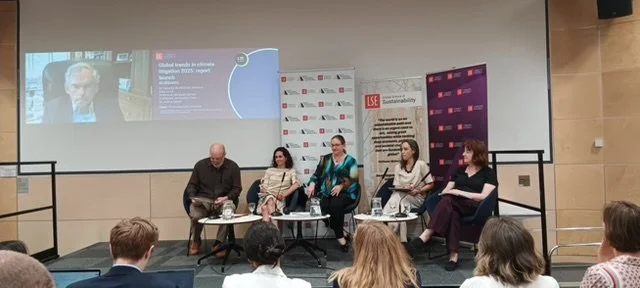On 26 June 2025 as part of London Climate Action Week https://www.londonclimateactionweek.org I attended the launch of the 7th edition of this hugely important and influential report and resource at the LSE Grantham Research Institute on Climate Change and the Environment https://www.lse.ac.uk/granthaminstitute/ .
It was introduced to a packed auditorium with a large online audience as well – a mark of the wonderful work of the LSE Grantham Research Institute and of its associates at the Sabin Centre for Climate Change Law https://climate.law.columbia.edu at Columbia Law School, USA. I sat between a former youth climate litigant, now working in AI, and a representative of Total Energy over from Paris, neatly demonstrating the wide range of views and interests involved.
The report is available online here -
https://www.lse.ac.uk/granthaminstitute/publication/global-trends-in-climate-change-litigation-2025-snapshot/
It was introduced by lead author Dr Joana Setzer https://www.lse.ac.uk/granthaminstitute/profile/joana-setzer/
(The other author is Catherine Higham https://www.lse.ac.uk/granthaminstitute/profile/catherine-higham/ )
Dr Joanna Stezer summarised the report’s highlights by saying -
Climate litigation is growing in complexity, maturing and expanding
There was particular growth in the Global South. There is greater complexity in climate cases, with challenges coming from multiple directions – for example, she cited the cases of Client Earth v Black Rock and Texas v Black Rock with litigation from opposite interests against the same financial company. (For details and all case citations, see the report itself.)
Maturity – Apex courts are shaping climate governance
276 cases reached apex courts globally: 117 in the USA, and 159 elsewhere. There was growing judicial engagement with complex legal questions around responsibility and enforcement.
New fossil fuel exploration was under increasing scrutiny. She mentioned the UK Supreme Court case of Finch v Surrey County Council on the need to consider Scope 3 emissions when authorising fossil fuel expansion, matched by a new advisory opinion from the European Free Trade Area ‘EFTA’ Court in Greeenpeace Nordic and Nature and Youth v State of Norway. The trend was for regulators to have to consider the implications of burning oil.
Attention was also turning to the implementation of judgements – Dr Selzer mentioned the cases of KlimaSeniorrinen v Switzerland and Do Hyun Kim et al – South Korea.
Expanding and evolving corporate litigation
The report cites 250 strategic corporate cases since 2015. 20% of cases filed in 2024 targeted companies.
The report notes expanding fronts in the animal agriculture and food retail sectors: and cases involving climate damages for localised illegal activities were also seeing success.
Dr Setzer concluded her summary with a discussion of impacts beyond the courtroom
This was followed by a brilliant panel of experts, chaired by Professor Larry Kramer, President and Vice Chancellor of LSE.
Professor Michael Gerrard https://www.law.columbia.edu/faculty/michael-gerrard
of the Sabin Centre, Columbia University, New York described some of the 300 lawsuits filed against the Trump administration, 76% of them successful in the lower courts, often on grounds of administrative mistakes, some reversed later on appeal.
He discussed State claims for money damages against fossil fuel companies, with 34 such cases in State courts, and particularly significant case in Massachusetts, Hawaii, Colorado, Montana, Pennsylvania, New York and California.
However on 29 May 2025 the US Supreme Court in the Uinta case had rejected arguments that the Transportation Board had to consider upstream and downstream effects of an 88 mile long rail line and oil delivery system from Utah, a case that ran contrary to the Finch and Norway decisions in Europe.
Professor Jacqueline Peel https://law.unimelb.edu.au/about/staff/jacqueline-peel
from Melbourne University gave a roundup of key trends and climate cases in Australia and the region, mentioning in particular Australia’s bid to host the COP31 climate talks, its leadership on Scope 3 emissions, and a sharper focus in cases on overall corporate strategy.
Dr Danielle de Andrade Moreira https://juma.jur.puc-rio.br/en/sobre-equipe
of Pontifical Catholic University, Rio de Janeiro, Brazil discussed the large number of climate cases from Brazil. These had a particular focus on deforestation in the Amazon region, strategic use of consititutional lawsuits and arguments, and an increasing number (40 cases) of damage based claims.
Kate Cook https://www.matrixlaw.co.uk/member/kate-cook/ Barrister of Matrix Chambers, London discussed some of her landmark work on climate cases before the International Tribunal on Law of the Sea and the International Court of Justice, where an Advisory Opinion is awaited on the request from Vanuatu for clarification of states’ responsibilities on climate change. She discussed how international law was advisory in its effect, and asked whether there was a coherent and effective body of law to address climate change. Was there a justice gap, or a compliance gap, or both? Despite her legal summaries, Kate Cook brought the discussion back to the urgency of confronting the common climate problem that faced us all, without losing sight of equity and justice.
This was a great event, informed by such expertise on the panel, to launch a report that is going to be invaluable to climate advocates around the world.
Passage in the USA on 4 July 2025 of the One Big Beautiful Bill Act was a reminder of how litigation is only ever part of the answer to climate change, but one that is going to be needed more than ever.

